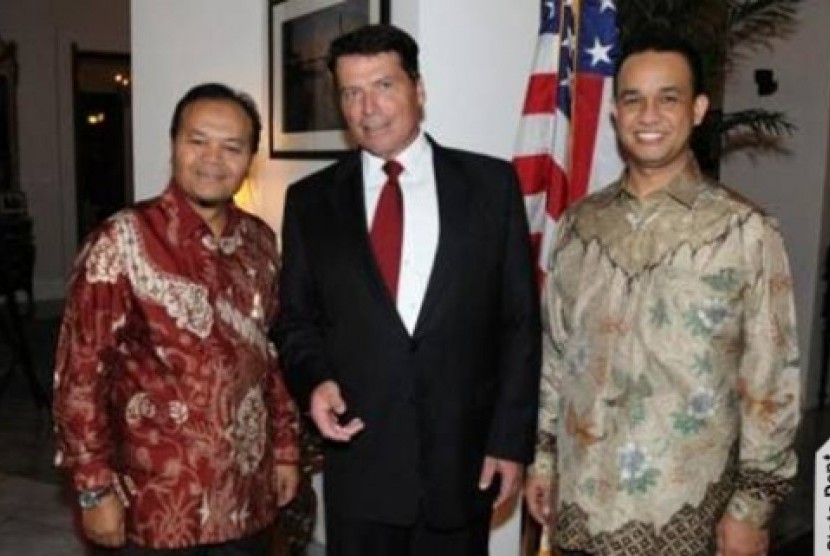REPUBLIKA.CO.ID, JAKARTA -- A poll result conducted by Institute for Independent Survey Nusantara (LSIN) showed, majority of public recommended Anies Baswedan as a presidential candidate from nonpartisan figures.
"Electability (desirability) of Anies Baswedan outperformed national figures such as Dahlan Iskan, Mahfud MD, Din Syamsudin, Said Aqil Siradj, and Rhoma Irama," Executive Director of LSIN, Mohammad Yasin, said here on Tuesday.
In a national survey of LSIN, presidential candidates in a span of 1 to 15 October 2013, with 1,500 respondents from 34 provinces, Anies Baswedan topped by a narrow margin over Dahlan Iskan.
Currently, Anies Baswedan electability is at 19.6 percent, followed by Dahlan Iskan 18.5 percent and Mahfud MD 16.3 percent.
In addition, Din Syamsuddin 6.1 percent, Said Aqil Siradj 5.0 percent, Rhoma Irama 4.3, then the remaining 2.0 percent spread to other names, then 28.3 percent of respondents did not answer or did not know non-partisan figures who deserves to be a candidate.
LSIN survey respondents then filed a few names that deserve to be assessed as 2014 candidates; Anies Baswedan, Dahlan Iskan, Mahfud MD, Din Syamsudin, Said Aqil Siradj, and Rhoma Irama.
Looking at the figure of Anies Baswedan, LSIN survey indicated that he was demanded by varied people in terms of demography, geography, socio-economy, and political background of respondents.
From the aspect of political ideology, respondent support for Anies Baswedan also came from different ideological and demographic aspects of the public interest by equally well in terms of gender, age, profession, and income level.
Geographically, support for Anies Baswedan also uneven across provinces in Indonesia and even dominant in Sumatra region.
According to him, the phenomenon cannot be separated from the figure of Anies Baswedan as an intellectual and young Indonesian leader. In 2007 his name was on rising when he served as Rector of Paramadina University and recorded as the youngest rector in Indonesia.
He attracted public attention through his activities for community care, especially in the field of education through a movement of Indonesia Teaching program.
He was also heavily involved in anti-corruption campaign with KPK. His passion in politics increasingly popular among public when he enrolled as presidential candidate on Democrat party's Convention.
Meanwhile, Dahlan Iskan's electability was preferred by respondents of different political ideology. He is also a participants of Democrat party's convention.
Geographically, support for Dahlan Iskan evenly distributed throughout the province, while demographically his electability was dominant among adults.
Dahlan electability driven from his position as a public official and ever served as Managing Director of Indonesia's electric company (PLN), and currently serves as Minister of State-owned enterprises, his position as a media entrepreneur also gave a major contribution.
His electabilty also supported by his character as a hard worker and spontaneous exemplary activities.
As a media mogul, Dahlan Iskan also socialized himself, both through his writings and political advertising.
In third place emerged the name of Mahfud MD. He is demanded by the respondents in the area of Java. He is known to public as an academic, Mahfud was a member of Parliament and served once as Minister of Defense.
His name was attracting public attention when he served as chairman of the Constitutional Court.
The next figure in Din Syamsudin, but its support base is still concentrated in large cities, especially Jakarta, while Said Aqil Siradj in fifth rank with centralized support only in Banten, West Java and partly scattered in East Java and Sulawesi.
On the last position is the artist Rhoma Irama. His electability is not proportional to his popularity.
Geographically his support is evenly distributed throughout the province, but it was minimal.
That position does not parallel with Rhoma Irama's background in politics as a mascot of Unity and Development Party (PPP) during the New Order era, served as House Representative in 1993, and appeared on stage of Justice and Welfare Party (PKS) in 2004 election campaign.
Currently, Rhoma Irama has been declared as the top presidential candidates by some Islamic cleric (Ulema) representatives and conducting political safari in many area with National Awakening Party (PKB).
However, the efforts have not been able to raise Rhoma Irama electability, even some of the respondents considered that Rhoma is worthy to become the "King" of dangdut (local music genre) than a presidential candidate.
Ed: Heri Ruslan


